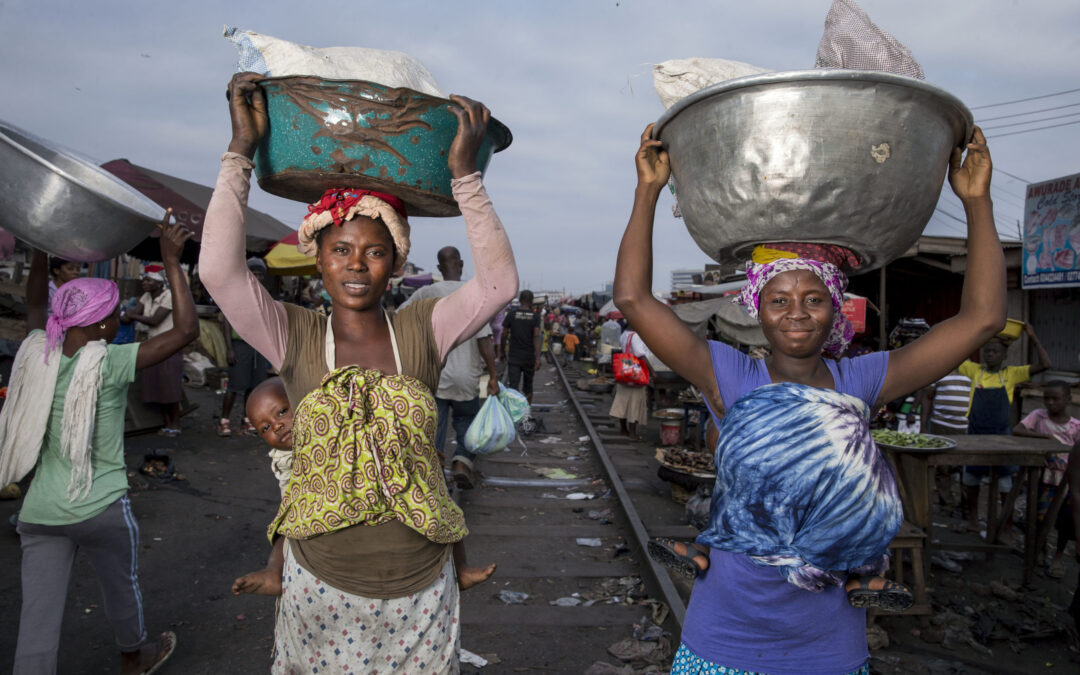
Jun 5, 2024
Through expanded regional and global partnerships, the Organization of Trade Unions of West Africa (OTUWA) is growing its campaign for increased budgetary allocation to health care in the region, said OTUWA Executive Secretary John Odah from Abuja, in a solidarity message to the opening session of the 24th Plenary of the West African Health Sector Unions Network (WAHSUN).
Now in its fourth year, OTUWA’s “Health Care Is a Human Right” advocacy campaign is allying with global union federation Public Services International (PSI), civil society organizations across the region and WAHSUN to better advocate for equal and fair health care access for all who live within the Economic Community of West African States (ECOWAS).
Nearly 83 percent of Africa’s workers are trapped in poorly paid and uncertain informal-sector jobs and lack access to state-provided health care or health insurance—an unfair financial burden on the continent’s most vulnerable individuals. And yet West Africa’s governments are not implementing the 15 percent minimum annual budgetary health allocation to which African heads of state agreed in the landmark 2001 Abuja Declaration. No country in the region achieves this percentage currently.
OTUWA’s campaign, launched in 2020 by national labor federations from five countries, has expanded its reach to health sector unions and national labor centers in eight countries—including the Gambia, Ghana, Ivory Coast, Liberia, Nigeria, Senegal, Sierra Leone and Togo—as well as to civil society organizations such as the International Federation of Women Lawyers (FIDA). The Office of the United Nations High Commissioner for Human Rights with the World Health Organization defines the right to health as “a fundamental part of our human rights and of our understanding of a life in dignity.” The Solidarity Center supports OTUWA in this campaign and on other worker rights initiatives.
“Together we must get public health services out of their chronic state of neglect and underfunding,” Odah told the Solidarity Center, adding that OTUWA’s campaign is adding good governance to its health care demands.
Thus far, the campaign has gathered and released important regional health care worker data and initiated advocacy meetings with national, regional and continent-wide African Union legislators and policymakers, including the Parliament of the Economic Community of West African States (ECOWAS). The campaign most recently saw success in Nigeria earlier this year, where the federal government announced a disbursement of almost $70 million to bolster the country’s health infrastructure.
“Only a transparent, democratic system can secure, fairly allocate and responsibly spend increased health care funds,” said Odah.
OTUWA represents national trade union centers in the 15 West African countries comprising ECOWAS. PSI encompasses more than 700 trade unions that represent 30 million workers in 154 countries.
Watch a video about the campaign.
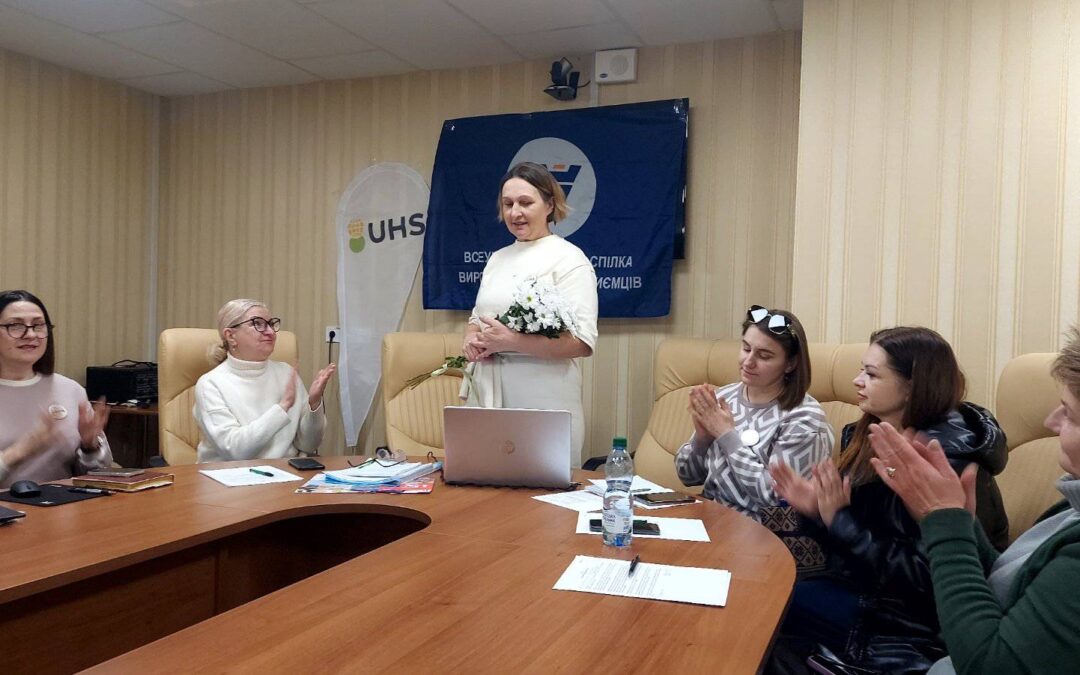
Apr 17, 2024
In a first for Ukraine, in-home childcare workers including nannies and babysitters organized and then elected domestic worker Tetiana Lauhina to head their new labor organization, Union of Home Staff (UHS).
“[My colleagues] are amazingly hard-working and well-educated. I want all of them to be recognized as workers and officially protected,” says Lauhina in a video interview.
The Union of Home Staff (UHS), formed by 17 domestic worker activists, will vigorously advocate with Ukraine’s lawmakers and government to ensure protections for domestic workers and formalization as workers under the country’s labor law.
As an outgrowth of nongovernmental organization Union of Home Staff (UHS), the new union will continue to use its allied organization’s name and acronym, UHS, expanding its services as an information hub and community center, including for its 1,800 Facebook members.
Ukraine’s first nationwide survey of domestic workers last year found that working without contracts and formal recognition had left most survey respondents victims of low pay, wage theft, confusion about employment status, exclusion from the country’s pension system and minimal capacity to exercise their right to freedom of association. And, without legal formalization as workers, Ukraine’s domestic workers lack access to care rights and services for themselves and their families—including maternity and child benefits, long-term care services and disability compensation for workers who die or are injured in their employers’ homes.
“[The domestic worker] is not secure and she is nobody for the state,” says Lauhina.
Because women account for three-quarters of the 75.6 million domestic workers globally, domestic worker rights are key to the achievement of equality. On International Women’s Day this year, the ILO issued a new policy brief urging governments and employers’ organizations to ensure that domestic workers have access to labor rights and social protections.
Nongovernmental organization UHS was formed in 2019 with support from Ukraine labor rights nongovernmental organization Labor Initiatives (LI) and the Solidarity Center to raise awareness about labor rights challenges for Ukraine’s care economy workers and support the country’s legislative efforts to formalize domestic work.
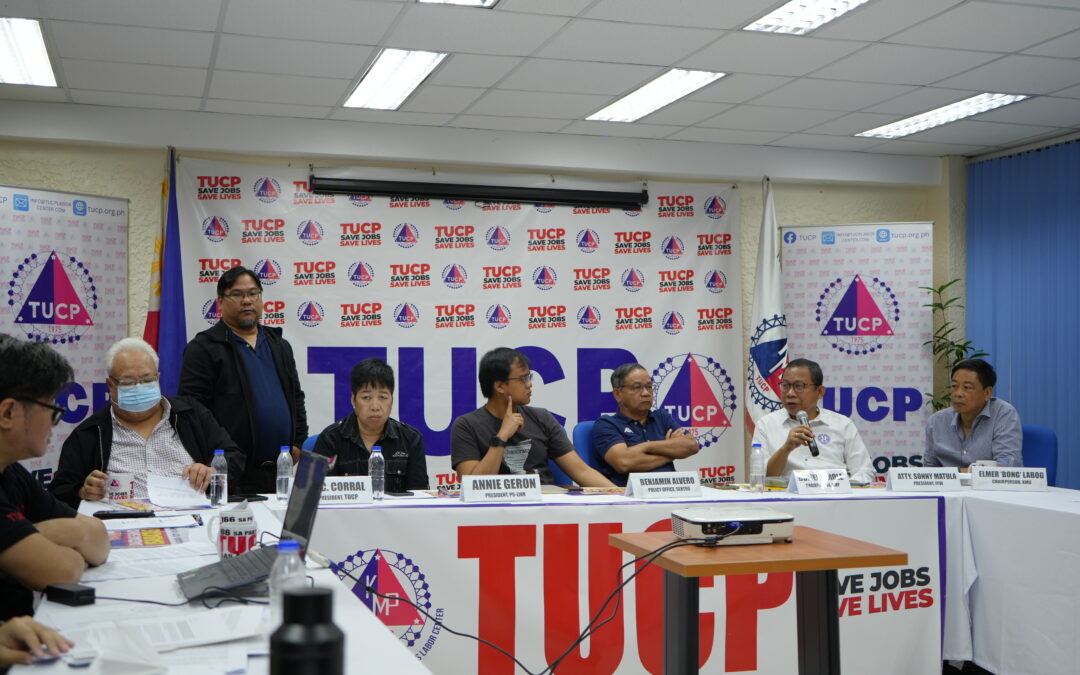
Mar 15, 2024
Philippine trade union leaders are calling for an across-the-board daily minimum wage increase in the private sector to alleviate the economic burden workers currently face.
House Bill No. 7871 calls for a wage hike of 150 PHP (approximately 3 US dollars). Amid high inflation, poor job quality and a lack of new and decent jobs, supporters argue that immediately passing and enacting the wage increase is critical to support workers’ economic recovery.
During a press conference in Quezon City on Thursday, Benjamin Alvero, chief policy officer of the Center of United and Progressive Workers (SENTRO) said, “This wage hike is not just a matter of economic development but also of justice. The wage hike that we currently have at the regional level is just to catch up with inflation, and that is not enough.”
“There is an urgency to pass this legislated wage hike as the first step in the right direction towards addressing the disparity between the family living wage standard and current minimum wage rates,” Philippine Labor representatives said in a joint statement.
Last month, the Philippine Senate approved a minimum wage increase–the first Congress-legislated wage hike since 1989—of 100 PHP (roughly 2 US dollars).
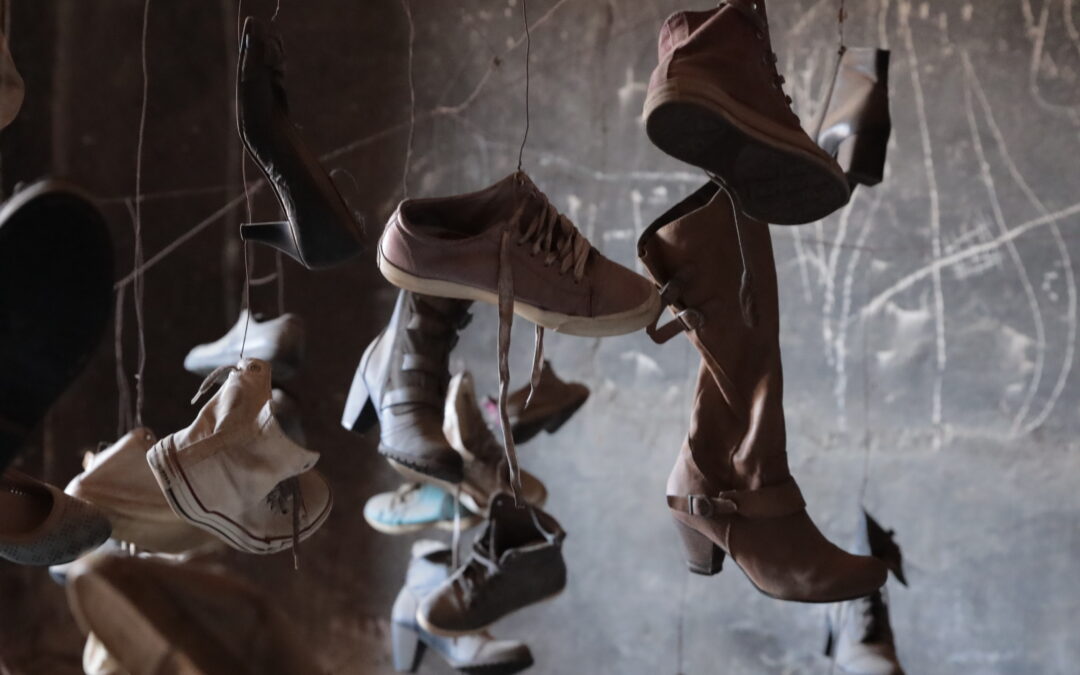
Mar 5, 2024
Kosovo teachers’ union SBASHK (United Union of Education, Science and Culture of Kosovo) is forging a shared school-family-community-policymakers’ agenda to build a multi-tiered mental health support system. This successful effort includes hosting a national conference last month during which attendees agreed to collaborate on solutions going forward and the Ministry of Education committed to increasing the number of school psychologists, addressing national mental health legislation and supporting national mental health awareness campaigns.
The conference—which brought together more than 80 representatives of Kosovo education unions and other union and civil society organizations, education, health care, government, the Kosovo Parliament, media, academia, students and parents’ councils—sought to destigmatize discussion of mental health; examined the latest research and best practices on mental health promotion, prevention and intervention for students, teachers and families; and facilitated opportunities for parents, policymakers, school administrators and teachers to work together on solutions.
“Mental health in Kosovar society is intertwined with a series of factors such as transgenerational trauma from the [1990s Kosovo] war, low salaries that make it difficult to meet vital needs, high unemployment rates, unsafe environments—including cases of sexual assaults—and poor-quality education,” Member of Parliament and University of Pristina Psychology Professor Fitim Uka told conference attendees.
During panel discussions, workshops and breakout sessions, roadblocks to mental health improvement in schools were identified, resulting in a joint appeal for more psychologists in schools, teacher and psychologist training programs, better teacher working conditions, specialized service referrals and advocacy campaigns for reducing mental health stigma, and, above all, for stakeholders to work together.
“This conference proves that, together, we can help for the good of a school and for an even better education,” said SBASHK Chairperson Rrahman Jasharaj.
Solidarity Center Executive Director Shawna Bader-Blau, who also presented, reinforced the call for a shared school, family, community and policymakers’ agenda.
“We’re all in this together, to help our children succeed and help our schools succeed,” she said.
During the 1998-1999 Kosovo war, SBASHK played a vital role in preserving education services. Today SBASHK advocates for better working conditions and fair salaries, safer schools and professional growth opportunities for teachers. A five-week 2022 teachers’ strike for a living wage in response to COVID pandemic and Ukraine war-related inflation earned teachers a significant salary increase, but regional economic challenges continue to threaten teachers’ well-being.
The February 21 and 22 Pristina conference, supported by the Solidarity Center, united stakeholders dedicated to enhancing mental health support in schools including SBASHK, the Ministry of Education, Science, Technology and Innovation (MESTI), the Ministry of Health (MoH), the Parliamentary Committee on Education, the Union of Independent Trade Unions of Kosovo (BSPK), the European Trade Union Committee for Education (ETUCE), Slovenia Education Union (SVIZ), the Education Unions of Albania (SPASH and FSASH), Union of Education, Science and Culture North Macedonia (SONK), the Association of Municipalities, the Municipal Directorate of Education (MDE), the Council of Parents (KP), the Council of Youth (KYC), the Chamber of Doctors, the Chamber of Nurses, the Department of the Psychology/University of Pristina (DP), Kosovo Education Center (KEC), the Kosovo EdGuard Institute and the Kosovo Association of Independent Journalists (AGK).
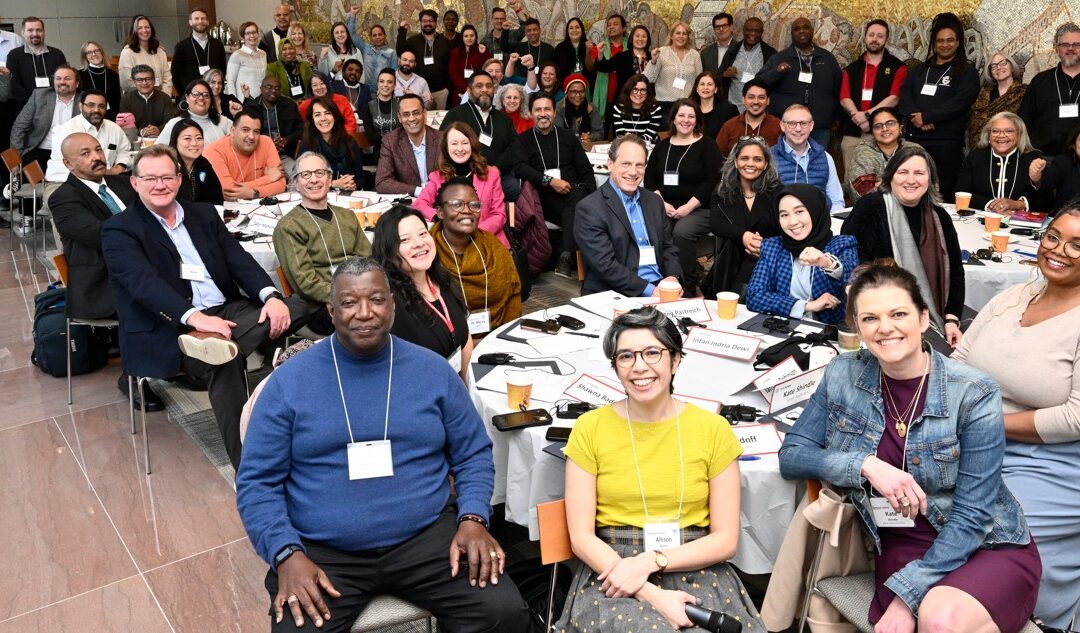
Feb 16, 2024
Dozens of union leaders from around the world who are working to advance democracy in communities and workplaces convened last week in Washington, D.C., to discuss the essential role of unions in leading social change and addressing multiple global crises, including strengthening democracy through the exercise and advancement of worker rights.
As part of the Global Labor Leadership Initiative (GLLI), a Solidarity Center partnership with the Worker Institute at Cornell, 22 union leaders and allies from 17 countries spent two days discussing movement building, the platform economy and strategies to tackle in-country and mutual challenges affecting working people, often in the face of brutal conditions. They then joined more than 70 U.S. and Canadian labor and justice leaders for a two-day event, “Meeting the Moment: How Can Unions Maximize Impact and Power in a Time of Increasing Polarization and Change?” where they shared strategies on how unions can step up efforts to defend and promote worker rights.
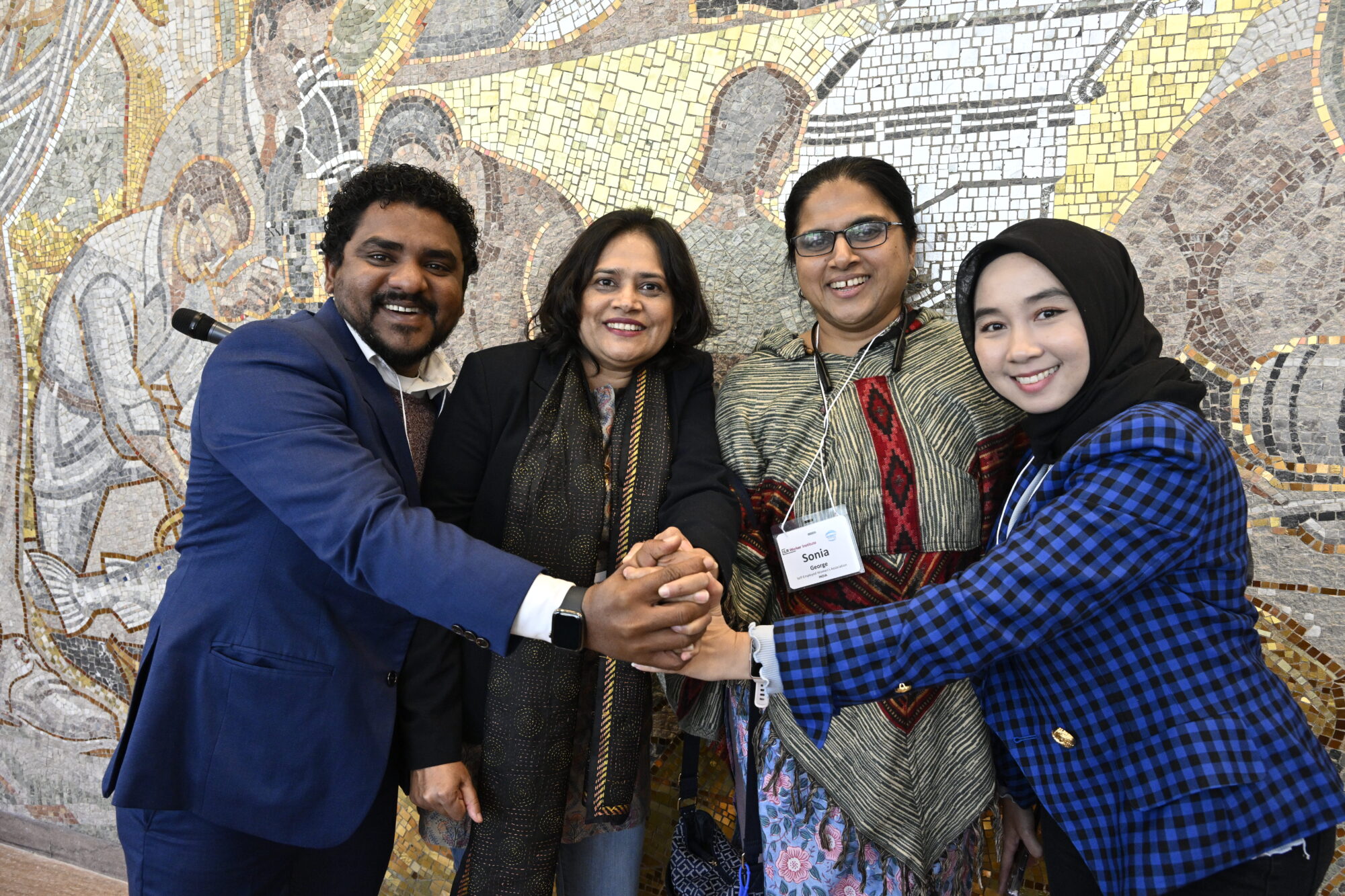
Global Labor Leadership Initiative (GLLI) participants Mauroof Zakir, Tourism Employees Association of Maldives (TEAM) General Secretary and Maldives Trade Union Council President; Nazma Akter, Sommilito Garments Sramik Federation (SGSF) President and founder (Bangladesh); Sonia George, Self-Employed Women’s Association (SEWA) General Secretary; and Intan Indria Dewi, SPN (garment and textile trade union federation) Banten Provincial Chairperson (Indonesia). Photo: Kaveh Sardari
“Democracy exists [only] where workers can be heard,” said Maicon Michel Vasconcelos da Silva, who spoke at the panel event and who serves as secretary of international relations of the Brazil National Confederation of Metalworkers (CNM).
Overwhelming evidence shows that democracy begins at work—in particular, where independent unions provide individuals with the opportunity to elect and be leaders, and join in common cause for better wages, benefits and working hours. Organized labor also holds politicians accountable. In recent years, labor lawyers pushed for justice following Brazil’s deadliest—and entirely preventable—mining disaster. An aviation union in Ukraine exposed rampant corruption in the terminal. And in Colombia, the labor movement shut down the country’s largest port to reach a landmark agreement from the government to live up to its promises to invest in a long-neglected and majority Black city.
Meanwhile, democracy enables workers and their unions to flourish and, as it is increasingly threatened around the world, democracy also depends on working people and their organizations to keep it resilient, said panel speakers and participants, emphasizing unions’ unique role and capacity to push back on unjust and undemocratic forces.
“Unionism and unionizing should really put all of its energy behind democracy,” said Sergio Guerrero in a separate interview. Guerrero, a platform worker in Mexico and general secretary of the National Union of Workers by Application (UNTA), added: “We can’t have a democratic society without unionized workers.”
Yet across every region of the world, “the global cost-of living crisis has been met with a crackdown on the rights of working people,” according to the 2023 International Trade Union Confederation (ITUC) Global Rights Index.”
“Organizing on issues of democracy, of human rights, of preservation of democratic procedure is something I think is essential for us as a union,” said Čedanka Andrić, president of the Serbia Trade Union Confederation Nezavisnost (Independence), who spoke to the Solidarity Center between sessions.
A key takeaway, said many participants, is that democracy cannot be taken for granted.
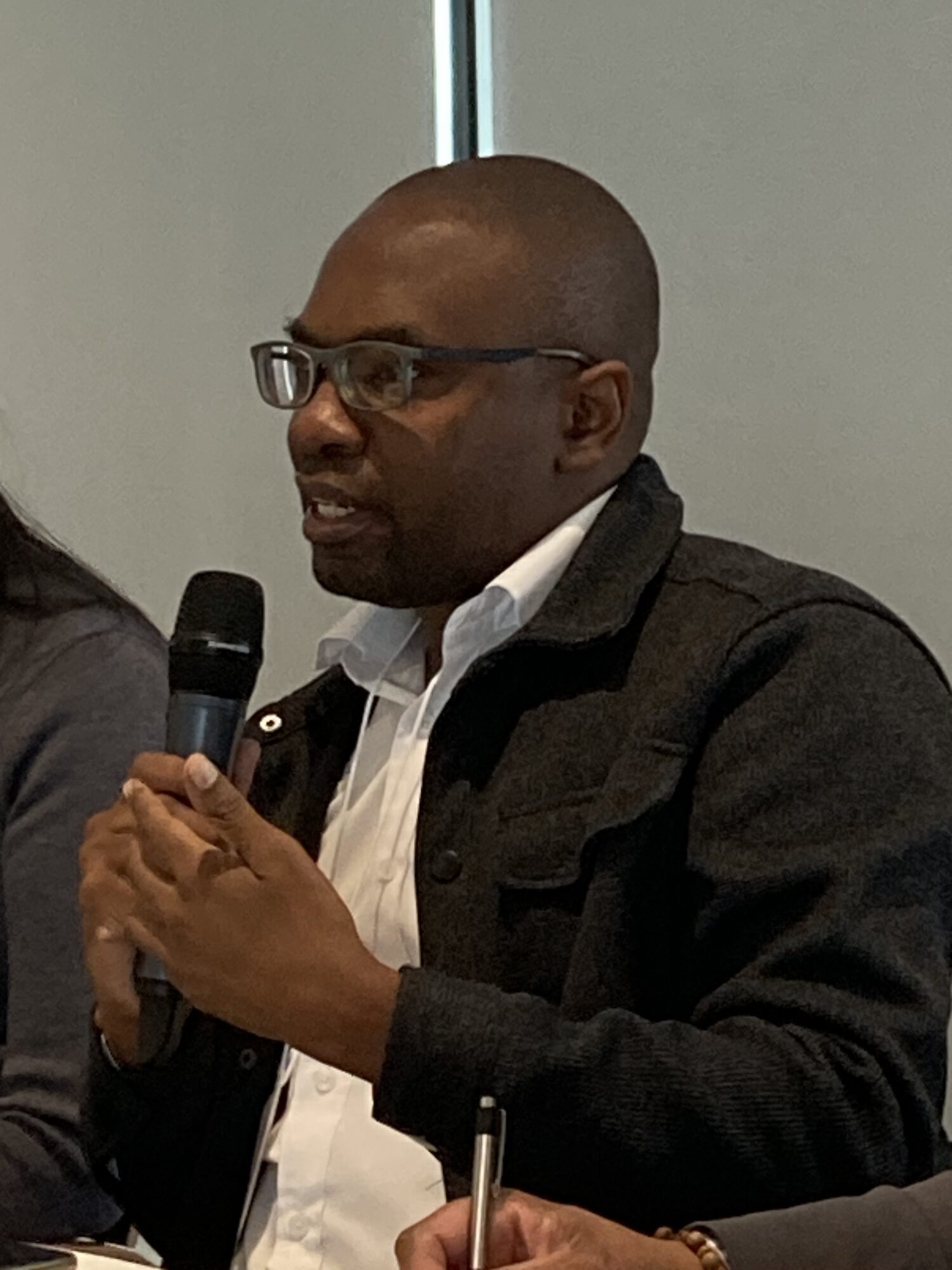
“No one is insulated from dictatorship. No one is safe,” said Peter Mutasa, who had to flee for his life following a violent crackdown on Zimbabwe unions. Photo: Kaveh Sardari
“We learned that the rights won by those who fought before us are transient,” warned Peter Mutasa, chair of the Crisis in Zimbabwe Coalition. Mutasa, former president of the Zimbabwe Congress of Trade Unions (ZCTU), had to flee for his life in 2020 following a violent crackdown on Zimbabwe unions and their leaders that began in 2018.
“No one is insulated from dictatorship. No one is safe,” he said.
The panel event concluded the 2024 GLLI convening. Organized by the Solidarity Center in coordination with Cornell’s ILR Worker Institute, GLLI provides participants with solidarity and skills-building opportunities so they can help build a dynamic, powerful and inclusive labor movement that can transform society and the economy so that it works for workers.
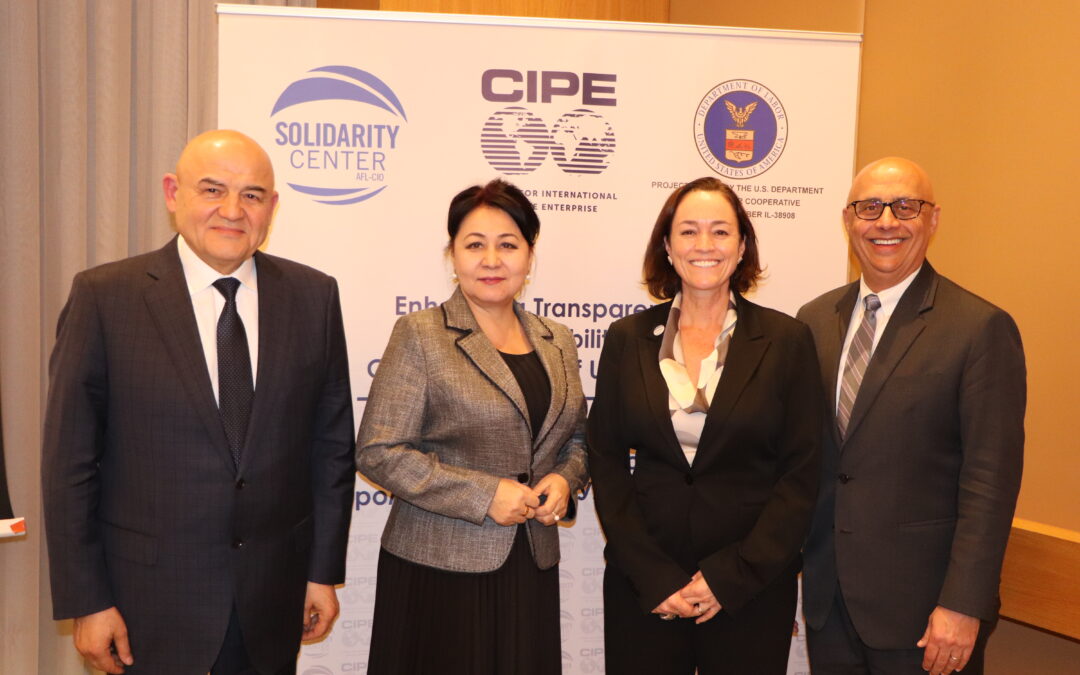
Jan 8, 2024
A groundbreaking cooperative agreement seeking to improve working conditions and prevent forced labor was signed this week for workers, ‘at all stages of cotton and textile production in Uzbekistan.’ Agreement signatories include U.S.-based Center for International Private Enterprise (CIPE), employers’ Association of Cotton-Textile Clusters of Uzbekistan, the Solidarity Center and the Uzbekistan Ministry of Employment.
The two-year memorandum of cooperation is the cornerstone of a new CIPE-Solidarity Center project that was launched at a public event in Tashkent in November. By meeting the sector’s need for an effective reporting and grievance remedy system, and providing an education and incentive system supportive to compliance, the project seeks to build on a 15-year effort that successfully eradicated forced labor in Uzbekistan’s cotton supply chain.
The “Enhancing Transparency and Accountability in the Cotton Industry of Uzbekistan” project—which will be implemented by CIPE and the Solidarity Center through activities laid out in the agreement’s accompanying action plan—is funded by the U.S. Department of Labor.
“The Solidarity Center looks forward to working with CIPE and the Cluster Association to support development of a cotton industry in Uzbekistan that is recognized and rewarded in the global marketplace for upholding labor standards at the highest levels,” said Solidarity Center Executive Director Shawna Bader-Blau at the program launch.
Project goals include to expand stakeholder dialogue to promote transparent market and management standards and employee-oriented accountability systems; establish trust and dialogue among cotton purchasers, producers, workers and the government of Uzbekistan; strengthen Uzbekistan’s cotton supply chain workers’ capacity to identify and effectively resolve labor rights violations through tripartite mechanisms and improved dialogue with employers; improve compliance with international labor standards, including freedom of association and corporate governance provisions; and foster cotton industry sustainability in ways that ensure labor rights are respected and protected.
Under the agreement’s accompanying action plan, program activities will include:
- Developing and piloting worker-led grievance and remedy mechanisms grounded in best international practices for supply chain transparency and management;
- Training workers, managers and employers in the cotton industry on fundamental international standards as defined in core conventions of the International Labor Organization;
- Promoting standards of transparency and commitment to labor rights and good corporate governance by creating a dialogue between stakeholders cotton enterprises, global brands, government agencies and worker representatives.
“We believe that our partnership will support the creation of effective management systems and serves to strengthen social protection, improve labor relations based on international standards and create decent and safe working conditions for workers,” said CIPE Managing Director for Programs Abdulwahab Alkebsi at the program launch.
After years of intense policy advocacy and campaigning, led by Uzbek and international civil society, combined with the Uzbek Government’s political will, state-imposed forced labor is no longer used in the cotton harvest. As a result, in March 2022, the Cotton Campaign ended its call for a global boycott of cotton from Uzbekistan and lifted the Uzbek Cotton Pledge.








